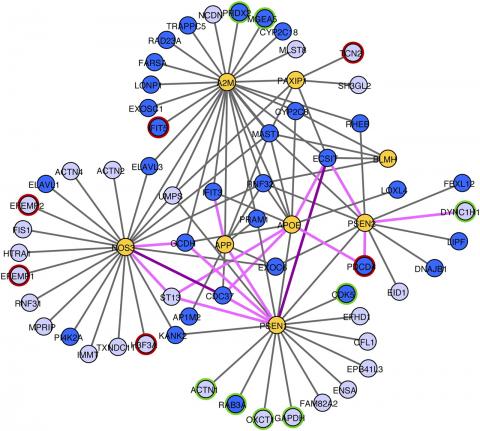Interactome mapping suggests new mechanistic details underlying Alzheimer's disease

Soler-López M, Zanzoni A, Lluís R, Stelzl U, Aloy P, Recent advances toward the characterization of Alzheimer's disease (AD) have permitted the identification of a dozen of genetic risk factors, although many more remain undiscovered. In parallel, works in the field of network biology have shown a strong link between protein connectivity and disease. In this manuscript, we demonstrate that AD-related genes are indeed highly interconnected and, based on this observation, we set up an interaction discovery strategy to unveil novel AD causative and susceptibility genes. In total, we report 200 high-confidence protein-protein interactions between eight confirmed AD-related genes and 66 candidates. Of these, 31 are located in chromosomal regions containing susceptibility loci related to the etiology of late-onset AD, and 17 show dysregulated expression patterns in AD patients, which makes them very good candidates for further functional studies. Interestingly, we also identified four novel direct interactions among well-characterized AD causative/susceptibility genes (i.e., APP, A2M, APOE, PSEN1, and PSEN2), which support the suggested link between plaque formation and inflammatory processes and provide insights into the intracellular regulation of APP cleavage. Finally, we contextualize the discovered relationships, integrating them with all the interaction data reported in the literature, building the most complete interactome associated to AD. This general view facilitates the analyses of global properties of the network, such as its functional modularity, and triggers many hypotheses on the molecular mechanisms implicated in AD. For instance, our analyses suggest a putative role for PDCD4 as a neuronal death regulator and ECSIT as a molecular link between oxidative stress, inflammation, and mitochondrial dysfunction in AD.
Genome Res,
2011, 21(3), 364-76
Pubmed: 21163940
Direct link: 10.1101/gr.114280.110
Link to the supplementary material
